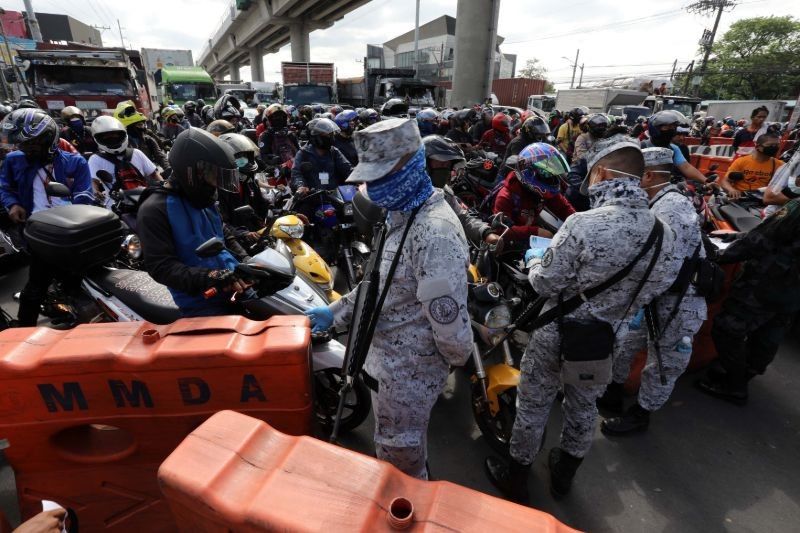Is this martial law? Lawyers' union answers questions on quarantine

MANILA, Philippines — The National Union of Peoples' Lawyers on Friday morning released a series of infographics on legal matters that said the enhanced community quarantine did not mean martial law as the Constitution and laws were still unaffected and in effect.
According to the lawyers' group, the Constitution only allows such a declaration in cases of invasion, rebellion or when public safety requires it.
During his initial declaration of a Metro Manila-wide community quarantine, President Rodrigo Duterte was careful to deny that the quarantine equated to martial law despite his insistence on deploying armed personnel to ensure peace and order.
"Hindi ito martial law. It's not even something extraordinary," he said.
However, he also warned students that anyone caught loitering could be arrested, saying, "I do not want anybody to interfere in your enjoyment. Ayaw ko na masita kayo ng police at military. It could be messy. Itong mga police at military, they have their orders to enforce."
Furthermore, the lawyer's group asserted that curfew can only be imposed if there is a valid resolution proclaiming so.
"Neither the [Metro Manila Development Authority, Philippine National Police nor Armed Forces of the Philippines] can impose curfews. They can only enforce valid curfews," they added.
People's rights
As a rule, they said, one's right to travel cannot be curtailed, but "it may be limited if it is really for the interest of national security, public safety or health."
"Such limitation must be provided by law," they said.
The lawyer's group also highlighted that only in the following instances can a person be arrested without a warrant:
- When you are caught in the act of attempting to commit a crime (flagrante delicto)
- During a hot pursuit or when a crime has just been committed and the police or law enforcement officer has probable cause to believe based on personal knowledge that you have committed such crime
- If you are a prisoner or person deprived of liberty who just escaped prison
"There is no crime unless there is a law that specifically defines it as such and penalizes it. And such law can only be applied to acts or omissions after it becomes law and not to acts or omissions before such law becomes law," they reminded the public.
In the event that one is arrested, the group also outlined the individual's rights:
- You have to be informed of your right to remain silent
- You have the right to competent and independent counsel preferably of your own choice
- If you cannot afford these services, you must be provided them
- These rights cannot be waived or given up except in writing and in the presence of counsel
- No torture, force, violence, threat, intimidation or any other means which undermine or prejudice the free shall be used against you
- Secret detention places, solitary, incommunicado or other similar forms of detention are prohibited
- One may confer with their lawyer at all times and may be visited by any immediate family, medical doctor, religious member, any national NGO recognized by the Commission on Human Rights, or any international NGO recognized by the Office of the President
Criminal, civil and administrative charges can be sought for arresting law enforcement personnel who do not accord an individual their rights upon arrest, as per Republic Act 7438 or "Act defining certain rights of person arrested, detained or under custodial investigation as well as the duties of the arresting, detaining and investigating officers, and providing penalties for violation thereof."
"Persons validly arrested without warrants of arrest have to be charged within the periods fixed under Art. 125 of the Revised Penal Code (which range from 12, 18 or 36 hours maximum, depending on the imposable penalty of the crime charged)."
Non-cooperation a crime?
Furthermore, the group bared a few misgivings with the idea of the criminality of non-cooperation.
Section 9e of RA 11332 or the Mandatory Reporting of Notifiable Diseases and Health Events of Public Health Concern Act prohibits "non-cooperation of the person or entities identified as having the notifiable disease, or affected by the health event of public concern."
"It is our opinion that this crime [is] not sufficiently defined in the law. The penal provision is so vague that it is open to interpretation and may give way to abuse by law enforcement authorities. It is open to legal challenge," the NUPL said.
They added that charges of resisting and disobeying enforces of the quarantine may be landed "only if you willfully disobeyed lawful orders of law enforcers." However, they were careful to mention that this still left the door open for demanding explanation and clarification.
What happens now?
As the health emergency and its resulting nationwide state of calamity continue to unfold, the union outlined a number of protections with regard to courts. As a result of the emergency, courts nationwide have reduced operations and adopted skeletal staffs.
While hearings are suspended for the time being, courts are still open on weekdays from 9 a.m. to 3 p.m. Posting bail, being a matter of liberty, is still possible, while courts may still act on matters pertaining to habeas corpus, promulgation of judgments and acquittals, reliefs for those arrested at this time and other related measures.
For now, hearings on non-urgent matters will be rescheduled, and the High Court has said that things will stay this way until April 12, 2020.
- Latest
- Trending































